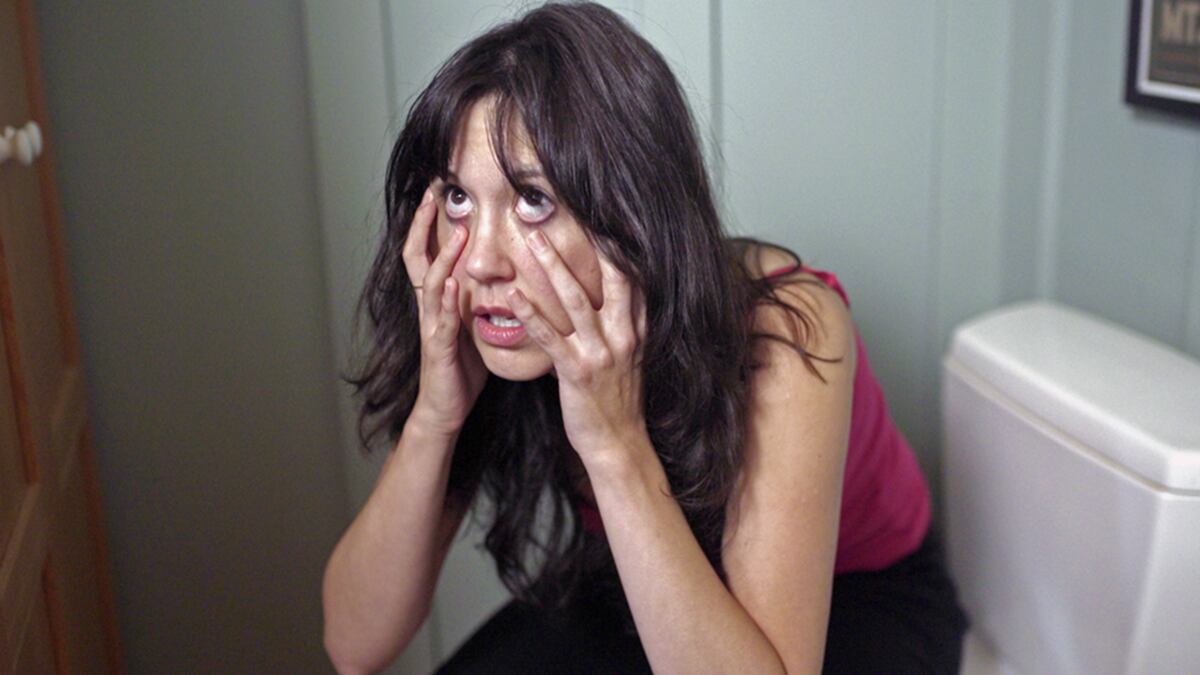When Oregon filmmaker Vincent Caldoni began mapping out his new alien abduction movie Contactee, he thought first in terms of power imbalance. After all, for contact to occur, one party traverses galaxies, possibly even dimensions, to explore another world. The other drives a blue Toyota Yaris 40 miles east of Portland.
Caldoni’s genre picture needed a grounding element—an earthly relationship beset with an analogous power imbalance and parallels to the invasive testing of many abduction narratives.
“I got to thinking about a therapeutic relationship where people can fall in love with their therapists, and therapists can fall in love with their patients,” says Caldoni, whose 15-year film career is highlighted by genre-hopping shorts and music videos for acts like Gojira and Alela Diane. “It’s very human! But it’s also such an overreach and terrible thing to do.”
That juxtaposition, fleshed out with the help of Contactee star Sara Robbin, helped Caldoni unlock the story of a Portland woman named Natalia (Robbin) and her boundary-breaking therapist (Patrick D. Green), who seclude themselves in a cabin on Mount Hood. There, they wait—for something cosmic to contact Natalia, based on what she’s shared in their counseling sessions. The ensuing film, streamable via Amazon Prime, is a disorienting cycle of unsound methods, meddling and control disguised as temptation. As days fade into countless nights and wine is poured a few too many times, Caldoni’s film commits to an aura of fishbowl entrapment.
“In a lot of those cases, I wanted the camera to be the beings,” Caldoni says. “They’re looking. They’re monitoring. I hope [it] makes the audience feel a little uncomfortable.”
While Robbin alternately soothes and toys with the audience through her character’s serial mood shifts, Portland actor Green parries with an erudite calm.
“In Patrick’s life before being an actor, he was a social worker,” says Caldoni, who cast Green to replace himself as therapist Jay Rossi. “He came in with a lot of understanding about the lines the character is crossing.”
Ironically, the barn-red mountain house itself—tucked away in Welches—is a serene place that holds special significance for Caldoni. Constructed in 1911 by his great-great grandfather, the cabin butts up against a shimmering alpine stream, and had been waiting for its star turn ever since Caldoni spent entire childhood summers there and “didn’t put shoes on the entire time.”
“I have had that location in my back pocket my whole life,” he says. “I’ve been making films since I was, like, 20. I’ve thought about it before, and I was like, ‘No, not yet. I only get one crack at this. I gotta save it.’”
Speaking of back-pocket ideas, the minimal special effects in Contactee borrow from a Stanley Kubrick technique famously deployed in 2001: A Space Odyssey. To create constellations and nebulae dancing across the black void of space, Caldoni poured coffee grounds into a stark-white bathtub and then inverted the colors by running the footage in negative. And though its specific use in the movie shouldn’t be spoiled, DIY effects also included a Zentai bodysuit doused in road-marking paint. Let the paint dry if you try that one at home, Caldoni advises; the fumes are murder.
As for influences, the writer-director holds some explicit interest in the alien-event genre through a long-standing fandom of The X-Files and Unsolved Mysteries. Even more, the volatile, isolated two-step of Contactee recalls films like Misery, Persona and Hitchcock’s Vertigo. Within that cluster of inspirations, it’s notable that Contactee never abandons its twisted therapeutic paradigm, no matter how heightened the science fiction. What you’re witnessing may or may not be human, but it’s always personal.
“I love a movie where you end up unsure about the identity of a person you related to,” Caldoni says. “Because then the credits are rolling and you’re going, ‘Who am I?’”
SEE IT: Contactee streams on Amazon Prime.

